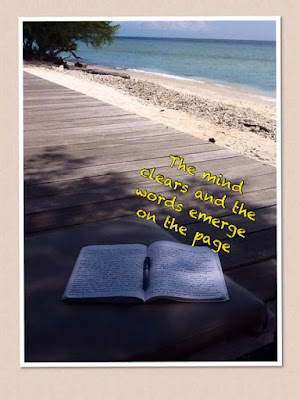The Potential Summer Holds For Teachers of Writing
It’s almost the end of another Australian school year, so I am aware of the level of exhaustion that exists in schools, and the need to tie up a multitude of loose ends prior to school closing for the summer holidays. Teaching becomes a race to the finish line. The last week of school seems to take the longest time of all the many school weeks. It is the epicenter for fatigue.
I urge you to get started over the break. Don’t put it off
until the school year begins. It will be too late then -overwhelmed by a myriad
of demands and organizational matters –you get the picture, I’m sure. The world is full of people who espouse good
intentions. The challenge is to turn one’s self into a real life action figure.
Some Things To Consider:
Feelings, dreams, family history,
daily activities, ideas, sketches or poetry. Information and insights for
yourself or have others share. Record the life of others - holidays, visits to
and from families, cultural and special events, holiday observances, New Year,
rituals, coming of age, weddings, christenings, school days, leaving school,
entering work, going to tertiary education, trips overseas, birthdays,
funerals, parties, photographs, clippings, articles, references, certificates,
drawings, keep-sakes, ephemera, artefacts and other original material.
Just as you want your students to make a good start to the
school year, you should expect the same for yourself. I’m not suggesting you to write to a rigid
schedule, just quarantine a little time to document some of the rich pickings
of your summer life. It will be a great investment in designing curriculum –
and it’s painless! The more you write, the more you begin to see possibilities.
I am not suggesting that you dedicate yourself to just writing about summer
exclusively. As always, you are best to focus on matters that are important to
you- close to your heart. Choice leads to voice. Maybe your reading might spark
your writing. Be open to possibilities.
I’m sorry, but there is no better time to send this message.
I need to reach you now while you still have your educators cap on. Hopefully,
it isn’t pulled down over your eyes and your hands aren’t over your ears.
 |
| My wife, Vicki writing in her writer's notebook while visiting Trani, Italy. |
This summer, don’t just dive into the surf. Set aside a little time to dive into some
writing. Try to approach writing, in the same manner that many so often
approach summer reading. The writes of summer could be the stimulus to launch a
great new school year in 2016! Strengthen your very own reading- writing connection.
I can’t offer a free
set of steak of knives with that, but I know writing comes with certain intrinsic
rewards.
 |
| Off to the beach with a book to read and my writer's notebook at the ready. |
To my fellow educators and writers- happy times reading, writing and relaxing.
I wish to end with some great advice from author John
Updike.
'You are full of your material—your family, your friends, your region of the country, your generation—when it is fresh and seems urgently worth communicating to readers. No amount of learned skills can substitute for the feeling of having a lot to say, of bringing news. Memories, impressions, and emotions from your first 20 years on earth are most writers’ main material; little that comes afterward is quite so rich and resonant. By the age of 40, you have probably mined the purest veins of this precious lode; after that, continued creativity is a matter of sifting the leavings.'







Comments
Post a Comment